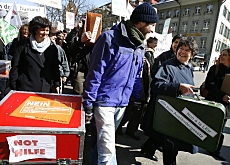Young foreigners need better integration

Integration of young foreigners can be improved in schools, according to a report released by Switzerland's Federal Migration Office.
While the office gave a generally positive evaluation of integration in the country, it warned that some youngsters could face poverty and exclusion if not helped.
The report, released on Tuesday, stated that the most important factor for successful integration was access to jobs, but that many people had trouble finding work.
Integration should be therefore promoted during vocational training, within companies and the job market.
Official figures show that around 50,000 young foreigners attend special classes, a form of education the report’s authors consider inadequate to ensure a successful move into proper employment.
Approximately one fifth of foreign youngsters never finish an apprenticeship or vocational training, increasing the likelihood they will be unemployed and become dependent on social aid.
Unemployment among foreigners is twice as high as among Swiss nationals, which stands at 3.6 per cent of the working population. People of foreign extraction are also more likely to live under the poverty line.
The office said that measures would have to be taken at the local, cantonal and national levels to improve integration, but added that these efforts would require coordination.
Improvements would also require involvement from the Federal Office for Professional Education and Technology as well as the State Secretariat for Economic Affairs (Seco), which would oversee the implementation phase.
Citizenship
The migration office also released another report on naturalisation, which comes 18 months after Swiss citizens turned down two federal proposals to ease citizenship requirements for second and third generation foreigners in Switzerland.
The first sought to speed up the naturalisation procedure for people aged 14 to 24 born abroad. The second wanted to grant automatic citizenship to children born in Switzerland of foreign parents.
Given the political climate, the study warns it would be unreasonable to expect citizens to change their minds any time soon. However, its authors admit that procedures for becoming Swiss should be simplified for young foreigners in the longer term.
The migration office suggests that cantons, which can set their own guidelines within the limits of federal law, apply the rules for second-generation foreigners rejected in 2004. This would benefit youngsters who had spent at least five years at school in Switzerland.
Giving citizenship to third-generation children as proposed in 2004 remains out of the question, however. But the report does suggests that procedures for citizenship be eased for youngsters older than 11 years of age.
swissinfo with agencies
The Swiss government considers better integration of foreign residents one of its most important challenges.
Integration is understood as a mutual process.
This process requires both the foreign nationals’ readiness to be integrated and openness on the part of the Swiss population.
It aims to offer equal opportunity regarding access to social and economic resources.
Federal law sets the government’s financial contribution towards the promotion of integration.
For 2004-2007 period, SFr14 million per year has been earmarked by the federal authorities.
There are 1.5 million foreigners living in Switzerland, just over one fifth of the total population.
Just over two thirds have permanent resident status.
In 2005, just under 40,000 foreigners became Swiss, the largest group of new citizens coming from Serbia-Montenegro.

In compliance with the JTI standards
More: SWI swissinfo.ch certified by the Journalism Trust Initiative











You can find an overview of ongoing debates with our journalists here . Please join us!
If you want to start a conversation about a topic raised in this article or want to report factual errors, email us at english@swissinfo.ch.